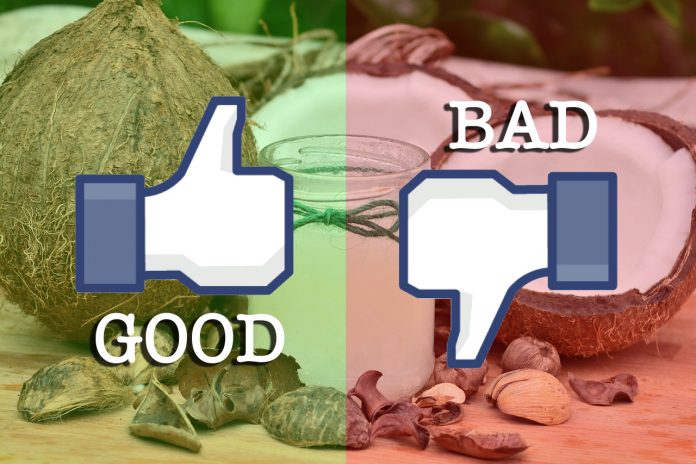
The following headlines have brought confusion to the field of health and research:
- Coconut oil isn’t healthy. It’s never been healthy – USA Today
- Nutrition experts warn coconut oil is on par with beef fat, butter – Chicago Tribune
- This popular health food is worse for you than pork lard – Daily Star
- Coconut oil isn’t as healthy as we thought, according to depressing new study – Elite Daily
Are you one of those wondering what’s really going on in the world? Are you thinking that coconut oil health benefits are fake news? This is same with hundreds of thousands of people on the internet! This article will be your reminder that you should always be careful where you get your health advice from. If it’s from the media, you should realize that many well-known reporters can play tricks on you — that’s a basic in the industry.
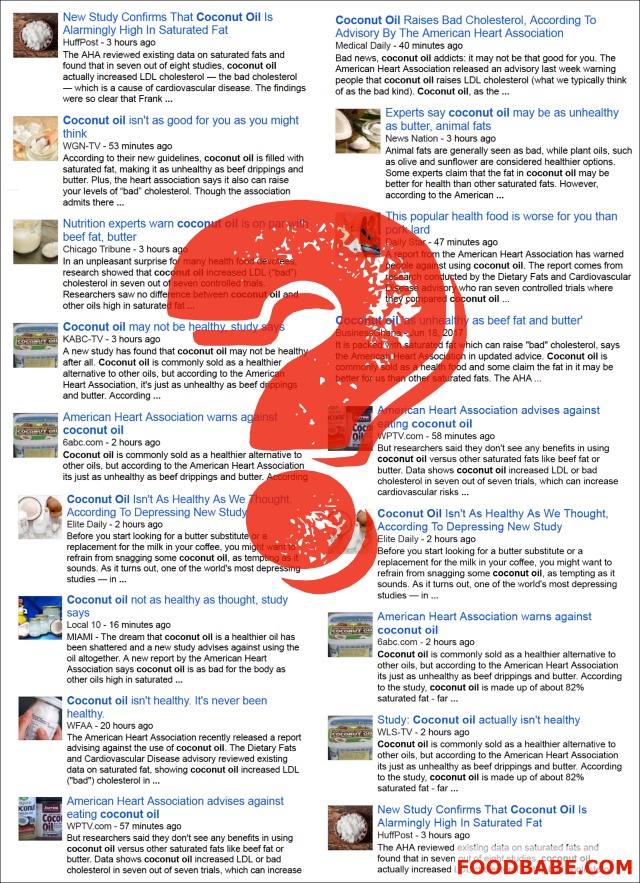
Examining the Source
This is true for all important news, especially when it concerns your health. Even if the source sounds and looks credible on the surface, you must check who they really are. For example, the American Heart Association (AHA). Make it a habit to always check their background history — who funds them? What are the claims they’ve presented in the past? In this highly political and manipulative world, it’s better to be safe than sorry.
Where did these headlines came from?
The AHA recently released a new Presidential Advisory recommending the avoidance of coconut oil due to its alleged connection to increasing “bad” cholesterol levels in the body which they claim cause heart disease. Frank Sacks, lead author of the report, said that the high saturated fat in coconut oil is the reason why people need to stop consuming it. Instead, he advised them to use canola, corn, soybean oil, or extra virgin olive oil especially when DEEP FRYING. Since when did deep frying became a healthy option?
“There’s nothing wrong with deep frying as long as you deep fry in a nice unsaturated vegetable oil” said Frank Sacks, lead author of AHA’s Presidential Advisory.
Can the American Heart Association Health Information Be Trusted?
Should we trust AHA’s recent claim? Let’s take their past report as an example. In 1960’s, this organization claimed that margarine (high in trans fat) is more “heart-healthy” than butter because it does not contain dietary cholesterol. Wait … what’s the main ingredient in making margarine? Wasn’t it hydrogenated oil full of trans fat? The Food and Drug Administration (FDA) then, banned hydrogenated oils because these were found to be RESPONSIBLE FOR MORE THAN 20, 000 HEART ATTACKS, ANNUALLY!
“Of the million Americans who die prematurely each year from heart disease — the leading cause of death in this country — at least 30, 000 are killed by trans fats.” — Harvard Epidemiologist Walter Willett.
AHA even certified food loaded with high amount of sugar and called it heart-healthy!
Some of these products include Cans of Bruce’s Yams In Syrup with 18 grams of added sugar per serving, Prego “Heart Smart” Sauces made with added sugar and canola oil, Starkist Ranch Tuna Creations with added sugar and MSG, and Pepperidge Farm Whole Grain Honey Wheat Bread with added sugar, soybean oil, and two additives that contain trans fats (DATEM and monoglycerides) all having the official seal of approval of AHA. The association also certified fat-free chocolate milk, cocoa puffs, lucky charms, and trix cereals, in the past.
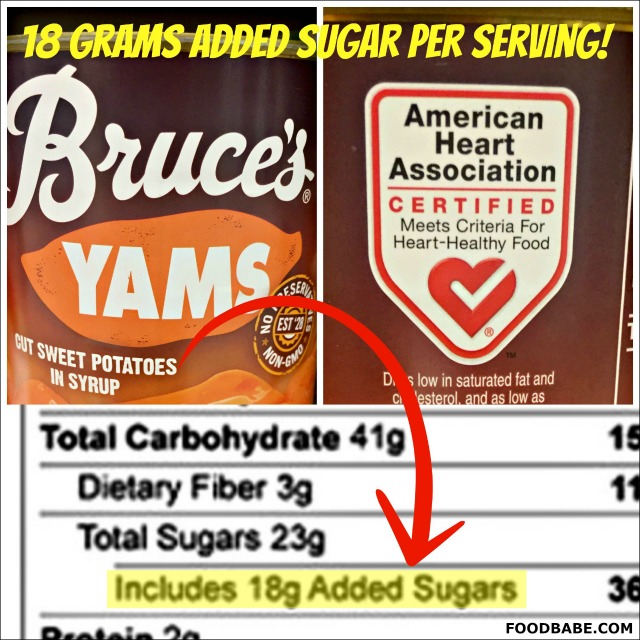

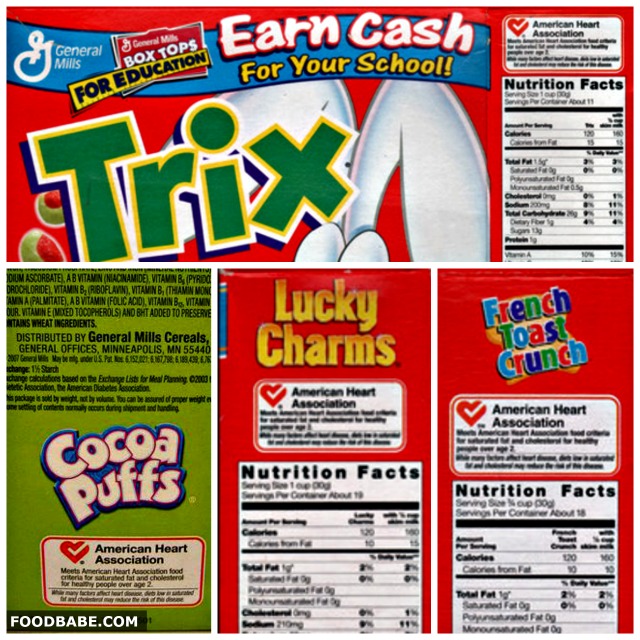
Even processed deli meats were found to be loaded with sugar, salt and preservatives — take the heavily processed boar’s head — which still have AHA’s seal of approval. Aside from these products, there are more insanely processed foods with the seal of AHA on them, paying thousands of dollars just to get the golden seal. The seal doesn’t come cheap. The association charges $7,500 per product in the first year and $4,500 every year after, though the fee drops if the company seeks to certify numerous products. The AHA can charge millions of dollars for the use of its name and logo in sponsorship agreements. The AHA doesn’t disclose how much money it makes from its food certification program.
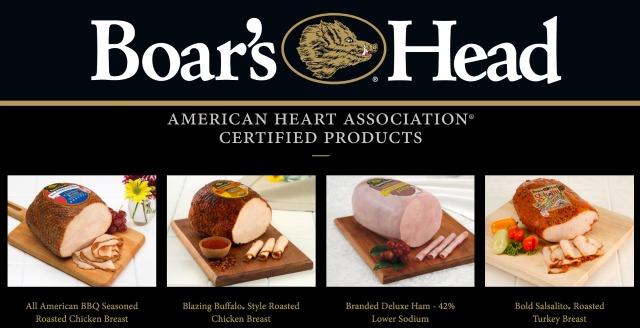
Why didn’t the AHA call those “foods” out, such as processed deli meats and those which contain high amounts of sugar since they have been found to increase the risk of heart disease?
“Researchers from the Harvard School of Public Health (HSPH) have found that eating processed meat, such as bacon, sausage or processed deli meats, was associated with a 42% higher risk of heart disease” – Harvard School of Public Health, May 2010
“Over the course of the 15-year study on added sugar and heart disease, participants who took in 25% or more of their daily calories as sugar were more than twice as likely to die from heart disease as those whose diets included less than 10% added sugar.” – Harvard Medical School, Feb. 2014
AHA even partnered with the “Healthy Dining Finder” which directs you to eat at Denny’s, Sizzler, and Red Robin. Do these restaurants really serve healthy food?
What can possibly happen to people who put their trust on AHA’s endorsements and eat sugar-loaded foods, nitrates, and trans fat for the long periods of time? This may lead them to sickness. If more people will be misled, what will happen to the world?
AHA’s Best Friend — Big Food Brands!
These are not AHA’s only friends. The years have made AHA a friend to more sponsors which include the worst Big Food brands there are, filling their products with soybean and canola oils, processed meats, and sugar. See them below:
- Kellog’s
- Pepsico
- General Mills
- Nestle
- Mars
- Domino’s pizza
- Kraft
- Subway
- Quaker
The AHA receives more than $15 million dollars annually from drug and healthcare companies. These include over $3 million from Pfizer — the creator of Lipitor, a statin drug for reducing cholesterol. Can these be the reason why AHA recommends Americans to take statins, even those who are old but healthy people, who have no history of heart disease? Even AHA’s research committee receives tens of thousands from drug companies to fund research, make trial appearances, and serve as consultants – which is an obvious conflict of interest.
The AHA Income for fiscal year 2016-2017
Pharmaceutical companies and device manufacturers,
$23,865,284
Food manufacturers, biotech companies, health insurance providers and other corporate supporters
$167,273,000
Non-reported source income
$729,868,000
The compensation for American Heart Association CEO Nancy Brown is reported as $1,850,348 for fiscal year 2017. Nancy Brown- “Volunteers have been our lifeblood since we were founded in 1924…” Yet she gets paid nearly $2 million USD per year.
The Conflict Continues to Other Authors of the New AHA Presidential Advisory
Penny M. Kris-Etherton, one author of the Presidential Advisory condemning coconut oil, revealed a significant fund given by Ag Canada, Canola Oil Council, and the National Cattlemen’s Beef Association. Is this the real reason why Kris-Etherton also recommended “lean beef” as heart-healthy, while canola oil to cut belly fat? Kris-Etherton was part of Unilever’s advisory board which created I Can’t Believe It’s Not Butter, Country Crock, Brummel & Brown, and Imperial Margarine, in the past.
Jennifer G. Robinson, another author, also revealed a significant funding from numerous drug companies, many of whom make cholesterol pills… Amarin, Amgen, AstraZeneca (maker of the statin Crestor), Eli Lilly, Glaxo-Smith Kline, Merck, Pfizer, Regeneron/Sanofi, and Takeda.
Aside from these, it has also been revealed that Frank M. Sacks, lead author of the Presidential Advisory, was also paid by the industry to testify in court cases involving POM Wonderful, Hershey, Unilever, and Keebler. He also testified for or has received consulting fees from several drug companies including Abbott, Amgen, Eli Lilly, Merck, Roche, Sanofi and has received lecture fees from AstraZeneca.

The AHA’s ties to the industry should be disclosed
AHA should choose where its loyalty lies. If they really are concerned with the health of people, they should not be protecting these industries in exchange of money. Given that their primary funds come from Big Food Companies and Pharmas, can we be sure that the authenticity and credibility of their health reports and opinions really promote health?
Saturated fat — is this the real enemy?
The AHA’s current report on the saturated fat found in coconut oil is NOTHING NEW coming from them. They have long held the position that processed vegetable oils such as canola, corn, soybean oils are healthier options, while putting in bad light all saturated fats and as detrimental to our health.
This belief has persisted thanks to intense influence of the Institute for Shortening and Edible Oils (ISEO), an industry trade group that supports vegetable oil manufacturers like Cargill, Bunge, and ConAgra.
“As far back as 1968, the ISEO was mentioned in an internal memo written by the medical director of the American Heart Association: According to the memo, the ISEO objected to the AHA’s intention to include a warning about trans fats in its dietary guidelines; subsequently, the AHA took it out.” ~ Mother Jones, August 2012
This can also be supported by an incident in 1960’s where the sugar industry funded a research hiding the connection between sugar and heart disease, while putting the blame on fat. This belief has remained until internal sugar industry documents were released in 2016.
Most experts still believe saturated fat in not the cause of heart disease, and even good for you
There are well documented evidences presenting that saturated fats do not increase your risk of heart disease. One of these is a recent meta-analysis in the British Journal of Medicine which supported this conclusion, same with another meta-analysis of 21 studies published in the American Journal of Clinical Nutrition. Another meta-analysis published in 2017 found that replacing saturated fats with polyunsaturated fats (like corn oil) do not reduce the risk of heart disease. You can check other meta-analyses on the list below:
- Re-evaluation of the traditional diet-heart hypothesis: analysis of recovered data from Minnesota Coronary Experiment
- Dietary Fats and Health: Dietary Recommendations in the Context of Scientific Evidence
- Is Butter Back? A Systematic Review and Meta-Analysis of Butter Consumption and Risk of Cardiovascular Disease, Diabetes, and Total Mortality
- Saturated fat is not the major issue
A 2015 study published in the American Journal of Clinical Nutrition revealed that saturated fats may increase the risk of heart disease, but NOT if they come from fish, dairy, or plants – such as coconuts! If you look at the countries that consume the most coconut oil, they’ve also got the some of the lowest rates of heart disease!
“For many years we have been told that to prevent cardiovascular disease (CVD), we must lower our intake of saturated fatty acids (SFAs) and instead eat more carbohydrates and polyunsaturated fatty acids (PUFAs). Backed up by the National Cholesterol Education Program, the National Institutes of Health, and the American Heart Association, the medical profession has promoted this idea eagerly, although the number of contradictory scientific reports is almost endless. There is in fact much evidence that doing the opposite is more relevant… There is no evidence that a lower intake of SFA can prevent CVD and a high intake of PUFAs without specification may result in a high intake of omega-6, which is associated with many adverse health effects. Because there is much evidence that saturated fat may even be beneficial, we urge the American Heart Association…to consider the aforementioned evidence when updating their future guidelines”. ~ The Questionable Benefits of Exchanging Saturated Fat With Polyunsaturated Fat, Mayo Clinic Proceedings, April 2014
If the AHA truly believes saturated fat is so bad, why do they have “heart healthy” recipes for beef and pork on their website, given these are the biggest sources of saturated fat in the American diet? Is it because the National Cattlemen’s Beef Association, the National Pork Board, Tyson, Hormel, and Smithfield have all paid money to post their meat recipes with AHA’s seal of approval? What do you think?
Cholesterol has been demonized, but wrongly so.
Recent researches also presented that cholesterol does some amazing things for your body, but with some degree of complexity. Though coconut oil raises cholesterol levels, Dr. Mark Hyman said that you just need to watch of for the cholesterol type which is getting the raise, its particle size, and high triglycerides.
“As a doctor, I tell patients that abnormal cholesterol can become a problem when it is the small dense LDL particles, accompanied by high triglycerides. In fact small LDL particles actually triple your risk of heart disease. This is caused by high-carb, low-fat diets and is improved when you add fat back to the diet, including saturated fat.” ~ Is Coconut Oil Bad for Your Cholesterol? Mark Hyman, M.D.
It’s also been shown that saturated fat in coconut oil increases “good” HDL cholesterol and increases the size of LDL particles (making them less likely to promote heart disease). However, when your cholesterol become low, it can lead to a heightened risk for cancer, Alzheimer’s, dementia, and morbid depression.
Instead of coconut oil, avoid “vegetable oils” like corn, soybean, and canola oil
These oils underwent an insane amount of processing with chemical solvents, steamers, neutralizers, de-waxers, bleach and deodorizers before they get into bottles. Corn and soybean oil contains very high in omega-6 fatty acids which can promote inflammation in the body. Chronic inflammation is a real killer, increasing the risk of heart disease, type 2 diabetes, and Alzheimer’s disease. These oils are also strongly linked to cancer since they are typically derived from GMO crops contaminated with Roundup herbicide.
Why is AHA still continuing to recommend people these highly processed food even with all the evidences against it?
The most plausible reason could be that AHA is protecting the profits of drug industry who are their sponsor. Consequently, Big Pharmas rely on us being unhealthy enough to need medicines, while the food industry which uses cheap oils in their food just because they don’t want to spend more on healthy ingredients.
AHA defaming coconut oil is not a surprise
The increase understanding of the public towards the truth about saturated fats and sugar, is freaking the industry out. They needed to find a new way to win back into the public’s hearts by using our weakness — our health — to scare us.
100 years ago, a death caused by heart attack was very rare. But in just a few short decades, it became one of the leading causes of death in the 1950s and remained as rank 1 killer among Americans. Nothing from the pharmaceutical companies nor from all the “trans fat-free” products can change this truth.
But look at this … the most significant changes in our diets such as the switch from natural fats to processed and refined vegetable oils have been prevalent. Data shows that in the last several decades Americans cut the fat from their diets by 25% while increasing intake of carbohydrates by more than 30%. The majority of these carbohydrates aren’t healthy fruits and vegetables either – but mostly refined breads, crackers, cereals, pastas, and other low-fat processed foods packed with added sugar. No one ever wanted to be fat and sick, yet the AHA let Americans live with this reality.
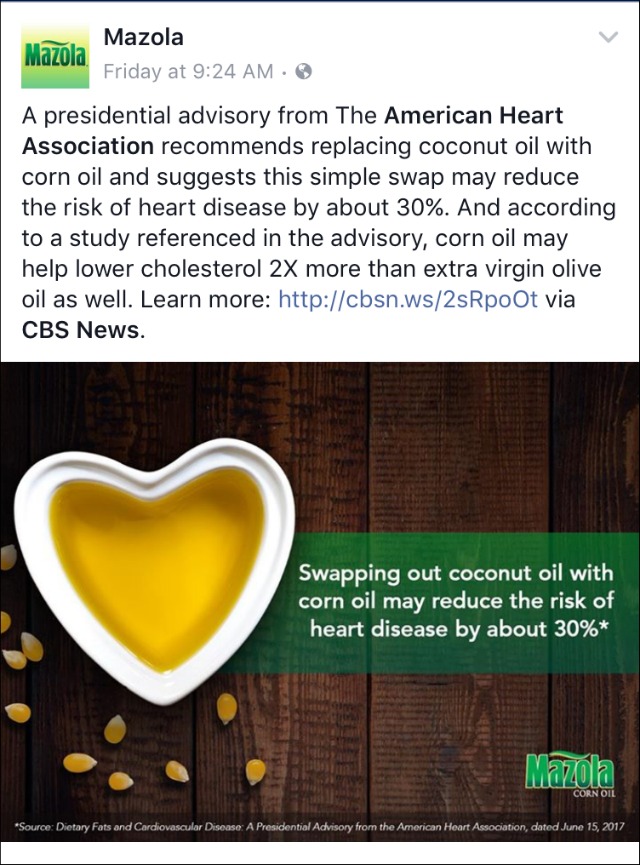
Health benefits of coconut oil
Saturated fat in coconut oil contains medium-chain triglycerides (MCT), which have been shown to increase your metabolism and REDUCE body fat while retaining muscle mass. Coconut oil works to bring down chronic inflammation in the body and is an amazing source of energy. It is also associated with increased antioxidant levels which can slow down the body’s aging! Just take a look at this sources:
- Dietary Medium-Chain Triacylglycerols Suppress Accumulation of Body Fat in a Double-Blind, Controlled Trial in Healthy Men and Women
- The application of medium-chain fatty acids: edible oil with a suppressing effect on body fat accumulation
- Physiological effects of medium-chain triglycerides: potential agents in the prevention of obesity
- Medium chain fatty acid metabolism and energy expenditure: obesity treatment implications
Source: https://foodbabe.com/coconut-oil-healthy-controversy-explained/








